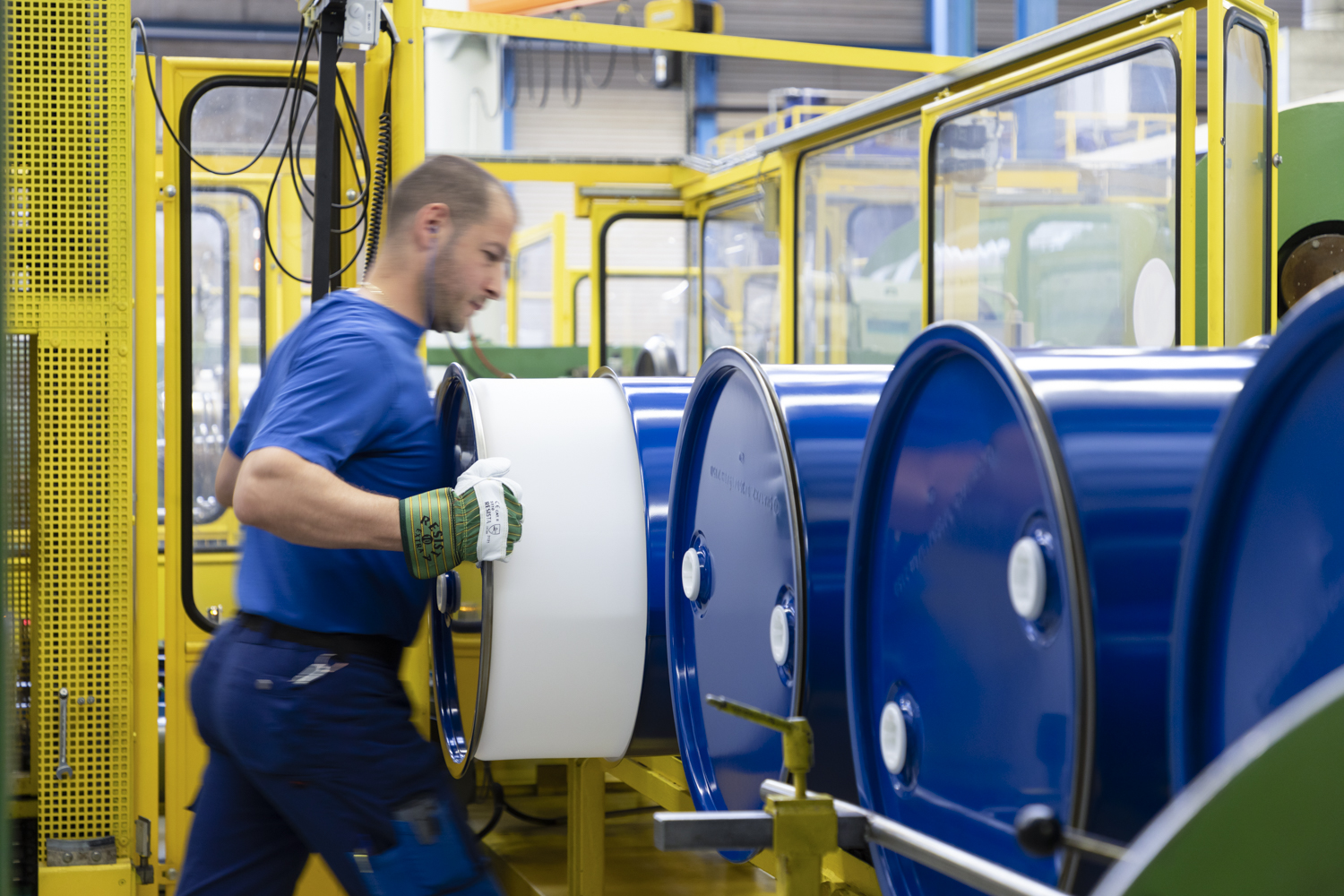Monthly Talk
 | Beat Studer. AVOR & PPS Manager.
|
 | Roger Eglin. AVOR & PPS Deputy Manager.
|
 | Marcel Kappeler. Leiter AVOR & PPS and QM-Officer.
|
"The point is to really have your mind on the work"
The smooth running of the production in Münchenstein and Reiden is mainly due to Beat Studer, Roger Eglin and Marcel Kappeler. They are in charge of the AVOR (Arbeitsvorbereitung - Work Preparation) and of the PPS (Production, Planning and Scheduling). A job that requires a cool head.
Müller Packaging produces its drums at the two sites Münchenstein and Reiden. What can one imagine, how many drums are produced there daily?
Beat Studer (BS): Three production lines are manufacturing our containers in Münchenstein. Two of them produce steel drums, one fiber drums (containers made of cardboard or kraft liner)
Marcel Kappeler (MK): In Reiden, we produce on two production lines: Line 1 produces drums without inner coating. Line 2 manufactures more diversified products including drums with inner coating, composite drums and stainless steel drums.
BS: Münchenstein and Reiden produce daily several thousand drums.
Are all drums produced on orders or do you also produce standard drums for stock?
Roger Eglin (RE): The drums are mainly produced on orders, since almost every customer has its own desires and requirements.
MK: It is the same with us. We too are producing almost only on customer orders. Sometimes, for customers who place regularly orders with us, we manufacture in advance and place the drums in a call-off storage. But we take great care not to let this storage grow too much.
How flexible must you be in production planning, if for example the sales send you an express order or if workers fall ill?
BS: Exactly these are the challenges that make the AVOR (Work Preparation) and the PPS (Production, Planning and Scheduling) departments so exciting and interesting.
RE: This is of course a challenge when an express order comes in and messes up a previously ideally planned production. But this is part of the business, and we are well-versed in reacting to such customer requirements.
MK: In Reiden too, we know these short-term customer orders (laughs). It happens again and again that customers contact the sales and ask if we can supply them a trailer (that is to say a truck) full of drums for the following day. Things then become exciting for us! Of course, we always try to meet such customer requirements. This flexibility in production is clearly a strength for me. It makes me proud when we jointly manage to handle such challenges in Reiden!
In the event of single employees absence, we try to manage the challenges in an interdepartmental way. Nevertheless, in the early days of the corona pandemic, we hat the compensate one or the other absence with temporary staff. But we can consider ourselves fortunate that, all in all, we got through the corona period rather well.
For the drums production, the semi-parts (bottom, lid and body) are manufactured first. The parts are then assembled to a drum in the actual drum production by seaming the material. Could you explain this seaming operation to our readers?
RE: It is true that we produce the bottoms, lids and bodies separately. Since, at Müller Packaging, we have internalized the lean concept, we try to produce the semi-parts in an order-related manner, so as to avoid creating unnecessary temporary storages that would require storage space and material, that is to say generate costs. Therefore, these various operations must be coordinated, so that, last but not least, the three parts can be joined to form an operational container, according to the order.
BS: When joining the bottom or the lid with the body, the parts are assembled with a round or flat seam. This functions more or less like when you roll up the fingers of your two hands and thus both hands close tightly. This interesting assembly of the drum components will be presented on site on the Open Doors day that will take place on June 18, 2022 in Münchenstein.

Two hands show how a drum seam is functioning.
Müller Packaging produces its containers in various materials. What are the main productions in Münchenstein and in Reiden?
BS: In Münchenstein, we primarily produce thin sheet metal drums. But we also manufacture drums out of galvanized thin sheet metal and pure stainless steel drums. Or production is designed for containers with a capacity from 0.4 liters up to 427 liters. This also includes special solutions - such as recovery drums or Swiss-Mini-Line (tight-head, lidded or composite cans made of the same materials and with the same coatings as the large original containers, on a reduced scale, to allow customers to perform 1:1 simulations). And, as mentioned previously, we also produce the lightweight fiber drums.
MK: In Reiden, we produce the voluminous 200-liter drums, mostly out of thin sheet metal, but also out of stainless steel and galvanized thin sheet metal. We also manufacture the composite drums.
Mister Kappeler, please tell us more about the composite drums and their production.
MK: The composite drums are basically two containers in one. Therefore, they offer the advantages of two drum types: the versatile product compatibility, freedom from corrosion and cleanliness of a plastic drum combined with the stability and permeation protection of a steel drum. We never produced as much composite drums as last year – despite the corona. Over the past ten years we produced an average of a six-digit figure of composite drums. In 2021, 15 % more drums than planned left our production. Another exciting point: we produce the 117-liter inner plastic containers also for the Münchenstein factory, which also produces composite drums.
Basically, the production of the inner containers is “nothing more” than another production process. But the extrusion blowing production process requires specially trained personnel and know-how.
The inner containers are bulky, so we must make sure not to lose sight of the storage of the produced plastic containers, which fills quickly. This is why it is important to produce the inner containers just in time and to plan accurately their transfer to the production lines.

A worker pushes an inner container into a steel drum in Reiden.
And then, some customers want the drums to be delivered with their corporate colors or with their logo printed on them. Is this activity planned in the production process?
RE: From the planning point of view, this is simply another additional operation. The customer sends us his specification, the sales department assesses it and the AVOR checks it for feasibility. If the maximum three colors or the printing of the logo can be technically implemented, this operation is added to the production list and taken over on the work order. The special point is that the work order bears a mark to allow all workers involved in the production to see that a color and/or a logo are to be applied on the container.
Also fiber drums are manufactured in Münchenstein. Are these easier to produce than steel drums?
BS: The production of fiber drums is technically less complex than that of steel drums. It includes less process steps, it requires less tooling and, due to their weight, the handling of the finished fiber drums is easier. In addition, unlike steel drums, these containers require no painting.
How do you keep an overview with all these many orders and production steps?
BS: The great challenge is to keep a structured way of working, remain calm in hectic times – and to communicate constantly with the production. The point is to really have your mind on the work.
RE: Of course, we have a computer system that supports us in our work. We use our “ABAS” ERP system to plan and monitor every day, even every hour, our production processes.
MK: Our ERP solution is a good tool. It allows us to plan orders directly on our two lines. It also records the pre-production of the semi-parts – which is then monitored by the system. In the event of cross-plant orders, that is to say for the production of the inner containers for the Münchenstein factory, communication plays a major role. Therefore, I am regularly in contact with Roger Eglin.
For me personally, the location of our office container in the production hall, close to the production lines, is very important. This way, I see and feel immediately whether everything is running smoothly. And, in the event of trouble, I can quickly reach the line.
Are there often failures at the production sites? What kind of failures? How do you solve them? How long does this take?
BS: Failures at production equipment can occur from time to time. So, it may happen for example that an element of the punching tool breaks, that spraying nozzles of the painting plant get clogged or that electronic components are faulty. The important point is then to find quick and pragmatic solutions.
RE: It then pays off to have, with our electrician, competent and experienced in-house specialists in our “Maintenance / Repair shop” department, who quickly make the production operational again.
MK: In the case of line production, so many electronic and mechanical components interact that something getting stuck or not running smoothly almost belongs to the weekly routine. Three points seem to me to be important here.
- Regular maintenance helps minimizing the failures.
- In the event of failures, we can rely on our experienced Maintenance team.
- The flexibility of the staff is important and available too. For example, if a failure occurs at 11 AM, we let the workers take their lunch break earlier.
In the last months, we read that, due to the corona, supply bottlenecks occurred everywhere. Were you affected too? And if yes, how did you react?
BS: Of course, we are dependent on the delivery deadline compliance of our suppliers. Corona has brought us one or another delivery delay. Such cases must then be assessed on a case-by-case basis. It is a fact that, due to corona, we had sometimes to reorganize our production, and that individual customer orders had to be postponed.
RE: There are also purchased parts that we always have been ordering early and in large quantities, in order to have them available at any time. This is why the interface to our Purchasing department is important to us.
MK: In Reiden we suffered no restrictions because of corona, and we passed this period rather well. We had sometimes to handle thin sheet metal economically, but we always managed to sufficiently supply our customers with drums.
You are working closely with the Sales, but also with the Production. What kind of discussions do you have in your daily work?
BS: Information exchange and thus communication with the Production and with the Sales is the most important both for AVOR and for PPS. Quick-flowing information arrives almost every hour and must be processed.
RE: An example. If the handle welding machine breaks down and the facility stands still for several hours, we must immediately adapt the production planning. Priority must be given to containers supplied without handles (thus not requiring the handle welding machine), in order to keep the production line running during this time and preventing any interruption of production.
MK: I am in contact with the Sales team in Münchenstein every day. We discuss new orders and deadlines, and we find solutions in the event of problems. I the must co-ordinate the following points with the Production and the Materials planning department: how do we allow space for new orders, how do we reschedule deadlines?
In the event of labor-intensive processes such as e.g. manual palettizing or inliner mounting, I must co-ordinate with the Production for both lines and sometimes also mobilize workers from other departments. In such cases, I feel the great readiness to help. We can see that, here in Reiden, everybody supports everybody.
And the last question: what does the fact to work in a company that will celebrate its 125-year jubilee in 2022 mean for you personally?
BS: Müller Packaging’s 125-year jubilee shows me that there are still today Swiss family-run companies committed to their location in Switzerland and who are able to operate successfully here. I have been working here for seven years, and the company has been steadily developing and remained competitive. This impresses me.
RE: I find it remarkable that Müller Packaging is investing year after year in the production facilities, always improving and optimizing its equipment. I think that this is important and gives us the possibilities to meet new customer requirements with innovative products. I appreciate working here and I find it thrilling, to work so closely with the production.
MK: I can only agree with Beat Studer and Roger Eglin. I appreciate working in a successful, well-positioned company that will remain also in the future a quality leader with high delivery punctuality. The future challenges can come. In Reiden too, we are ready!
Those were great insights into your work. Thank you very much!
